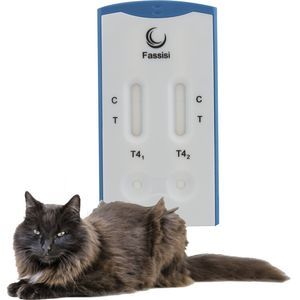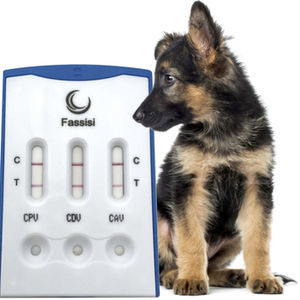
- Laboratory
- Laboratory medicine
- Rapid leishmaniasis test
- Fassisi, Gesellschaft für Veterinärdiagnostik und Umweltanalysen mbH

- Products
- Catalogs
- News & Trends
- Exhibitions
Rapid leishmaniasis test CANVECTO 4for dogsleadbacteria
Add to favorites
Compare this product
Characteristics
- Applications
- leishmaniasis
- Patient type
- for dogs
- Tested parameter
- lead
- Micro-organism
- bacteria, Ehrlichia, Anaplasma phagocytophilum, Dirofilaria, Leishmania
- Sample type
- serum, plasma
- Specificity
96 %, 96.7 %, 100 %
- Sensitivity
92.5 %, 94.1 %, 95.2 %, 97.7 %
Description
The rapid test to detect Dirofilaria immitis antigens, Anaplasma phagocytophilum antibodies, Ehrlichia canis antibodies and Leishmania antibodies in dogs.
Easy on-site usage, with results available within a few minutes
For serum, plasma and whole blood
All items required are included in the testkit
Storage at 2-30 degrees
Further information
Anaplasma and ehrlichia are vector-borne (ticks), intracellular bacteria. Dirofilaria immitis and the dog's leishmaniasis are transmitted by blood-sucking mosquitoes.
D. immitis (CHW): Infection with D. immitis can lead to a serious and even fatal disease in dogs. Adult heartworms can survive in dogs for 5-7 years. The antigen test is used to detect circulating D. immitis antigens in the blood; adult female heartworms are detected.
Anaplasmosis: In Europe, Anaplasma phagocytophilum is found in domestic dogs. The antibodies are detected using A. phagocytophilum antigens.
Ehrlichiosis: Dogs infected with Ehrlichia develop canine monocytic ehrlichiosis. The occurrence of infection is related to the spread of the vector R. sanguineus. The antibodies are detected using E. canis antigens.
Leismaniasis: In Europe, dog leishmaniasis is caused by the protozoon Leishmania infantum. The antibodies are detected by a specific antigen and can be used in diseased dogs about six to eight weeks after initial infection.
Remarks for the test result interpretation: Negative test results in antibody tests: they do not rule out an infection, as seronegative results can occur at any stage of infection. Positive test result for antibody tests: In the endemic area, positive antibody results can be due to a previous infection.
Other Fassisi, Gesellschaft für Veterinärdiagnostik und Umweltanalysen mbH products
PRODUCTS FOR SMALL ANIMALS
Related Searches
- Assay kit
- Blood assay kit
- Serum assay kit
- Plasma assay kit
- Blood rapid diagnostic test
- Rapid lateral flow test
- Immunoassay rapid diagnostic test
- Cassette rapid diagnostic test
- Rapid virus test
- Whole blood detection kit
- Serum rapid diagnostic test
- Plasma rapid diagnostic test
- Infectious disease rapid diagnostic test
- Whole blood rapid diagnostic test
- Urine rapid diagnostic test
- Laboratory detection kit
- Bacteria rapid diagnostic test
- Strip rapid diagnostic test
- Animal assay kit
- Rapid feces test
*Prices are pre-tax. They exclude delivery charges and customs duties and do not include additional charges for installation or activation options. Prices are indicative only and may vary by country, with changes to the cost of raw materials and exchange rates.

















